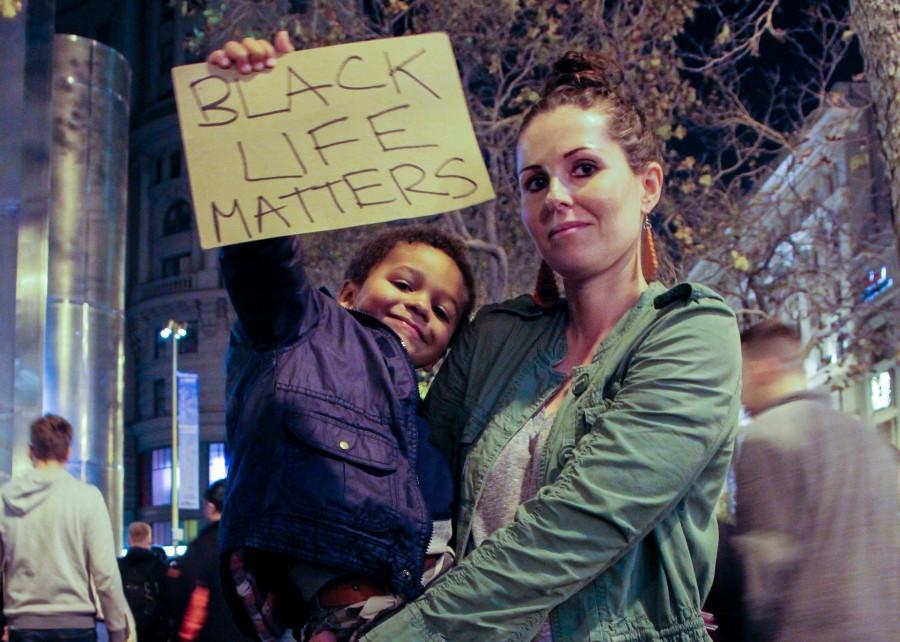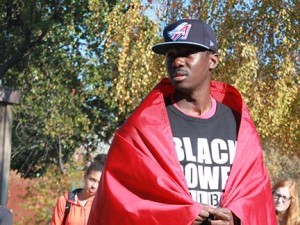It is time to confront America’s unspoken struggle
Porcia Thurston and her son Darius join the Black Friday protest on Market Street in San Francisco on Nov. 28.
December 9, 2014
The latest decisions not to indict white police officers in the killings of unarmed black men ignited protests across the country, but it also sparked a very difficult, yet necessary conversation regarding race in America.
When a white politician like New York Mayor Bill de Blasio has the same concerns that many in the African-American community do, which is how to keep their black children alive, it is time for government and the public to start a dialogue.
“What parents have done for decades, who have children of color, especially young men of color, is train them to be very careful when they have a connection with a police officer,” de Blasio opened up to ABC’s George Stephanopoulos on Dec. 7.
Somehow the country forgot to continue to speak of racial issues when we elected and re-elected a black President. As a nation we thought there was no longer a need for important dialogue such as police brutality against black suspects versus white.
We became desensitized towards the fact that racist slurs have become the norm even when it comes to the person holding highest office in the U.S.
Former Secretary of State Colin Powell told Meet The Press in 2013 that Republicans continue to use racist attacks against President Barack Obama because there is still a “dark vein of intolerance” in the party, according to the Daily Mail UK.
“That slave-era language is being used to describe Obama as a result of the party’s shift to the right – something leaders must address if they hope to win the presidential election in 2016,” Powell said.
The fact that police systemically discriminate in their profiling method during a routine traffic stop or in face of resisting arrest, is a well known fact.
Young black males in recent years were at a far greater risk of being shot dead by police than their white counterparts – 21 times greater, according to a ProPublica analysis of federally collected data on fatal police shootings.
The 1,217 deadly police shootings from 2010 to 2012 captured in the federal data show that blacks, age 15 to 19, were killed at a rate of 31.17 per million, while just 1.47 per million white males in that age range died at the hands of police.
“It’s different for a white child,” de Blasio told Stephanopolous. “That’s just the reality in this country. And with Dante, very early on with my son, we said, look, if a police officer stops you, do everything he tells you to do, don’t move suddenly, don’t reach for your cell phone, because we knew, sadly, there’s a greater chance it might be misinterpreted if it was a young man of color.”
There are a vast number of racial disparities in the judicial, political and social system in our country; the shootings of unarmed black men are just one example.
While it may be true that crime and gang activity in minority communities is higher in comparison to other demographics, the issues are far deeper and more complicated than what media and politicians portray them as.
A response that many have had is that black people need to stop killing each other. But poverty and a lack of opportunities due to systemic racism are important factors that can’t be ignored.
When white supporters of the cause permeate protests and social media, saying “Black Lives Matter” and “Stop Killing Our Children,” it does not mean that suddenly there is no racial divide and everyone is friends.
A far greater conversation needs to be held among people from all communities.
Community leaders need to make a greater effort to open up the race dialogue, in order to understand the deep-rooted, underlying issues communities face.
Our judicial system needs an immediate overhaul to ensure fair treatment of members of all communities and to get rid of the fear mongering towards certain races.
We are all Americans and we all must be treated as such, regardless of color.







































































